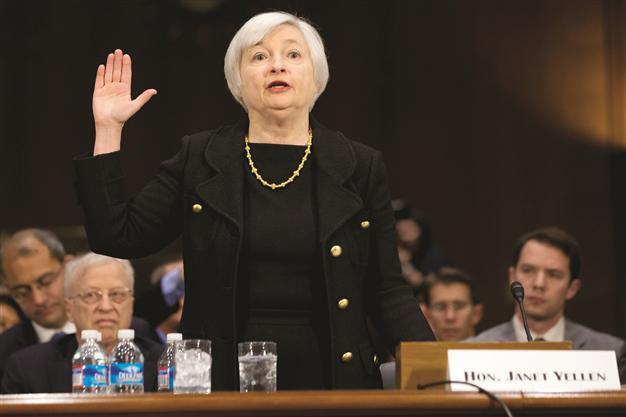Fed Vice Chair says stronger job growth a Fed imperative
WASHINGTON - Reuters

Janet Yellen, of California, President Barack Obama’s nominee to become Federal Reserve Board chair, is sworn in on Capitol Hill in Washington, prior to testifying before the Senate Banking Committee hearing on her nomination to succeed Ben Bernanke. AP photo
Fed Vice Chair Janet Yellen has robustly defended the Federal Reserve’s bold steps to spur economic growth, calling efforts to boost hiring an “imperative” at a hearing into her nomination to become the first woman to lead the U.S. central bank.Answering questions before the Senate Banking Committee on Nov. 14, Yellen made plain she would press forward with the Fed’s ultra-easy monetary policy until officials were confident a durable economic recovery was in place that could sustain job creation.
“I consider it imperative that we do what we can to promote a very strong recovery,” Yellen told the panel.
If confirmed by the Senate, as widely expected, the former professor and long-time public servant will become the most powerful woman in the history of world finance. She was nominated by President Barack Obama to succeed current Fed Chairman Ben Bernanke, whose term expires at the end of January.
Investors like ‘recovery’
Financial markets watched Yellen’s performance closely, both for clues on future policy and to see how she would stand up under the pressure of the panel’s questioning.
Investors liked what they heard, particularly her emphasis on the need to drive a stronger recovery. U.S. stocks rose as she testified, with the Dow Jones industrials and S&P 500 index closing at fresh record highs.
U.S. Treasury debt prices also climbed, as did gold prices, while the dollar held earlier gains.
With her husband, Nobel-Prize-winning economist George Akerlof, seated behind her, Yellen appeared poised, calm and well-prepared as she answered and parried some pointed but respectful questions from the mostly male committee members.
The hearing largely lacked flashpoints and, importantly, the seasoned central banker made no missteps that might have rattled investors.
“This ain’t her first rodeo,” was the title of a research note from JPMorgan’s Fed watcher Michael Feroli.
Yellen, who has served as the Fed’s No. 2 official since 2010 and who led the San Francisco Fed before then, has been a strong advocate of the U.S. central bank’s aggressive and unorthodox measures to boost economic growth and employment.
The Fed has held interest rates near zero since late 2008 and has quadrupled its balance sheet to $3.8 trillion through three massive rounds of bond purchases. Some Republican lawmakers worry those actions risk stoking inflation or asset bubbles, concerns that were aired at the hearing. “I think the economy has gotten used to the sugar you’ve put out there, and I just worry that we’re on a sugar high,” said Senator Mike Johanns, a Republican from Nebraska.
Yellen admitted the bond buying, or quantitative easing, could not continue forever and said the Fed was acutely aware the program had costs as well as benefits. But she said the benefits outweighed the costs right now, and made clear there was no set timetable for reducing the Fed’s current $85 billion per month pace of purchases, saying any decision would be driven by economic data.
“I do not see the program as continuing indefinitely,” Yellen said. “We are attempting to assess whether or not we have seen meaningful progress in the labor market. And what the (Fed’s policy) committee is looking for is signs we will have growth that is strong enough to promote continued progress.”
Fed to focus on stability
Yellen said she did not believe that U.S. stocks or the housing market were in bubble territory, and assured the panel that the central bank would focus intently to spot any risky investment behavior before financial stability was compromised.
“I absolutely believe that our supervisory abilities are critical, and they’re just as important as monetary policy,” she said.
Yellen also said she would not rule out using monetary policy to prick future bubbles, although she said it was a blunt tool that should only be used when regulatory measures fail.
The banking committee, where Democrats occupy 12 of the 22 seats, needs to vet Yellen’s credentials before sending her nomination to the full Senate for consideration.
A committee aide said the panel could vote on Yellen as early as next week, although a senior Democratic aide separately said the full Senate would not be able to vote before the Thanksgiving holiday at the end of the month.
Despite worries among some Republicans that she might not be tough enough on inflation and asset bubbles, she is expected to easily win confirmation.
















